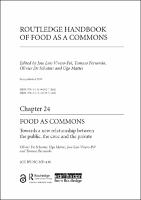Chapter 24 FOOD AS COMMONS
Proposal review
Towards a new relationship between the public, the civic and the private
| dc.contributor.author | De Schutter, Olivier | |
| dc.contributor.author | Mattei, Ugo | |
| dc.contributor.author | Vivero-Pol, Jose Luis | |
| dc.contributor.author | Ferrando, Tomaso | |
| dc.date.accessioned | 2018-11-01 23:55:55 | |
| dc.date.accessioned | 2019-10-17 14:38:15 | |
| dc.date.accessioned | 2020-04-01T11:55:16Z | |
| dc.date.available | 2020-04-01T11:55:16Z | |
| dc.date.issued | 2018 | |
| dc.identifier | 1002508 | |
| dc.identifier | OCN: 1082957251 | en_US |
| dc.identifier.uri | http://library.oapen.org/handle/20.500.12657/27499 | |
| dc.description.abstract | This book was motivated by the need to approach with a fresh look what we regard as perhaps the most embarrassing predicament of the Anthropocene/Capitalocene (Capra and Mattei, 2015, Altvater et al., 2016, Moore, 2017). We live in an era with roughly the same number (about one billion) of over-fed people and of people lacking access to nutritious food (which means that do not know in the morning if they will be able to feed themselves and their children during the day). Our era also stands out by the remarkable amount of food that is wasted in some parts of the world and by the unprecedented number of livestock that populates this planet (Patel and Moore, 2017). Moreover, in the current phase of neoliberal capitalism that dominates in the Anthropocene/Capitalocene, the ecological footprint is out of control; some rich people (the majority in the Global North and the elite in the Global South) can enjoy every day food shipped from thousands of miles away on gas gulping aircrafts and boats that pollute the environment beyond imagination. Such luxury, the result of the worldwide colonization of diets, would be impossible without a very significant environmental subsidy; if all the externalities had to be internalized, eating Nile Perch would be unaffordable to most people everywhere. The subsidy is ultimately paid by the poor in the South and, in general, will certainly be paid by future generations. Unless we deal with and avoid the hidden social and environmental costs that are so far unaccounted for in the hegemonic food system (TEEB, 2018) | |
| dc.language | English | |
| dc.subject.classification | thema EDItEUR::T Technology, Engineering, Agriculture, Industrial processes | en_US |
| dc.subject.other | Food | |
| dc.subject.other | commons | |
| dc.subject.other | public | |
| dc.subject.other | civic | |
| dc.subject.other | private | |
| dc.title | Chapter 24 FOOD AS COMMONS | |
| dc.title.alternative | Towards a new relationship between the public, the civic and the private | |
| dc.type | chapter | |
| oapen.relation.isPublishedBy | 7b3c7b10-5b1e-40b3-860e-c6dd5197f0bb | |
| oapen.relation.isPartOfBook | d8656a17-ef2d-49d3-a15d-96d5b42f3652 | |
| oapen.relation.isbn | 9781138062627; 9781315161495 | |
| oapen.imprint | Routledge | |
| oapen.pages | 24 | |
| oapen.remark.public | 3-8-2020 - No DOI registered in CrossRef for ISBN 9781351665520 | |
| oapen.identifier.ocn | 1082957251 | |
| peerreview.anonymity | Single-anonymised | |
| peerreview.id | bc80075c-96cc-4740-a9f3-a234bc2598f1 | |
| peerreview.open.review | No | |
| peerreview.publish.responsibility | Publisher | |
| peerreview.review.stage | Pre-publication | |
| peerreview.review.type | Proposal | |
| peerreview.reviewer.type | Internal editor | |
| peerreview.reviewer.type | External peer reviewer | |
| peerreview.title | Proposal review | |
| oapen.review.comments | Taylor & Francis open access titles are reviewed as a minimum at proposal stage by at least two external peer reviewers and an internal editor (additional reviews may be sought and additional content reviewed as required). |

